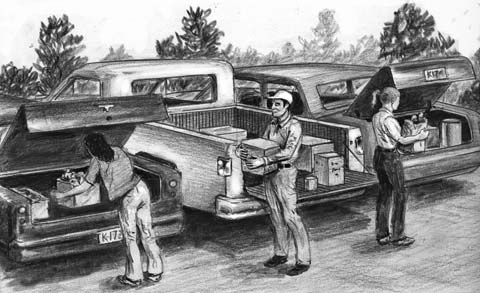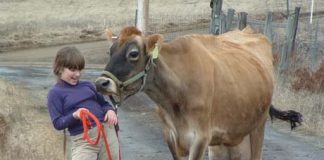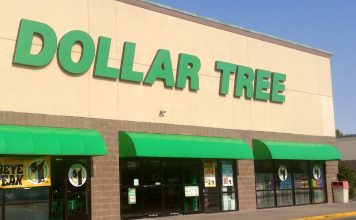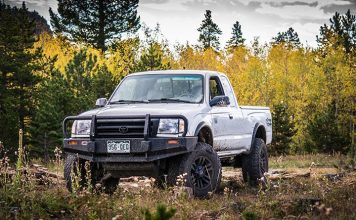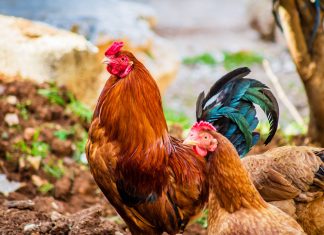| Issue #111 • May/June, 2008 |
Hardcore survivalists cherish what I call the “George Romero Scenario.” It goes like this: The proverbial poop has hit the propeller. Cities collapse into chaos. But we, the prepared, are…well, we’re prepared. We hunker in our rural bunkers, clutching our Super Whiz-Whacker 3000 combat arms, eagle-eyed and ready for any eventuality. We boldly fend off wave after ravenous wave of starving city folk who stagger at us like unstoppable zombies in a Romero horror flick. These zombies crave not our living flesh, but our six-gallon, mylar-lined superpails of dried lentils, our root cellars full of last year’s carrots, and our genuine, federally issued Meals Ready to Eat.
Well…maybe.
Seriously, it could happen. I can laugh about it now only because I spent so many years envisioning it myself.
We buy into the Hollywood-fed lone-wolf image. Our society is no longer built on everyday trust and neighborly reliance. The world is full of unfriendly strangers. If the other guy doesn’t take care of himself…well, then to hell with him. It’s dog eat dog. Survival of the fittest.
Us or them!

And it’s true; in any major, long-term disaster, prepared people genuinely could face “zombie” threats from the desperate unprepared. But those threatsas we shall see further downare likely to take a form that George Romero wouldn’t find very cinematic.
The fact is, for most of us rural people, one of the biggest things we’re going to face in event of a major or minor disaster is this: a need to cooperate with others who are in the same boat and who share similar privations.
Other people are not the enemy. They may be our lifelineand we theirs. We need a circle of well-prepared friends more than we’re likely to need a .50 cal long-range scoped rifle with a muzzle brake that has “Have a nice day” carved into it.
Making connections
Here’s a preparedness truth we should all tattoo on our minds: No matter how well prepared we think we are, we will lack something. It may be something obvious. It may be something obscure. It may be something we forgot to prepare for. It may be something we had that got lost, damaged, or used up. But we will lack something.
My isolated corner of the world got hit with a horrific windstorm a few months ago. Nothing moved or functioned for days afterward. Every one of my off-grid neighbors ran out of gasoline for their generators and chain saws.
A friend of mine once needed to administer first aid following an earthquake. When he opened his recently store-bought first-aid kit, he discovered that items in it were years beyond their expiration dates and that liquids had leaked all over the bandages and dried into a disgusting crust.
After the big windstorm I smacked into a different kind of problem. Physically I was fine. I had heat, food, shelter, and safety. But emotional numbness made it hard to make decisions. If not for a resourceful neighbor who offered to trade his chainsaw and fence-repair skills for the remnants of my damaged yurt, I might still be sitting here staring stupidly at storm wreckage. I lacked something I could not buy.
The government would ask us to turn to them when our own preparedness fails. But waiting for FEMA or the National Guard delays help. Telling us to wait tells us to be passive. It tells us to rely on “experts” and outsiders. That’s exactly what we don’t need when everything suddenly goes to hell on us.
The government asks us to behave like dependent children at exactly the moment our best adult skills are demanded of us.
I was lucky to have a hardworking young neighbor to trade with. But it was luck. Well, not 100 percent luck. I was smart enough to live in a community with a strong ethic of mutual help. Smart enough to have the kind of friends who carry chainsaws in their trucks.
Yet it was luck for the whole community that the gas stations started functioning just a few days later. Luck that the grocery store didn’t run out of food. Luck that very few people were injured. And this is the kind of luck we simply can’t count on.
We need to start preparing to count on each other. We need to get together with neighbors and friends and enhance each other’s preparednessnot out of altruism, but out of pure practicality. We need to do it so that we’ll all be better off in a crunch.
What are some of the specific things we might do?
Well, obviously, we don’t go off and tell just anybody, “Hey, here’s where I keep my year’s supply of #10 cans, and by the way, my silver coins are buried fifty paces southwest of the old oak tree. Now show me yours.”
We can start simply and emphasize the practical.
If some real disaster has recently struck our area, the aftermath gives us a perfect opportunity to go to our neighbors and do a mutual reality check. What did we run out of? What could we have used? Where did we screw up? What could we do differently next time? Without ever appearing to organize any sort of “mutual preparedness league” we can start coming to agreements: I can store extra gasoline for you in my shed (with a dose of Sta-Bil, of course). Since you have better first-aid skills, can you help me build up a better medical kit?
If your area has basked in sunshine and prosperity with no disasters in near memory, this is still a good time to approach neighbors because so many people are worried about the state of the larger world. They’re worried about climate change bringing stronger and more frequent storms. They’re worried about fuel shortages. They’re worried that the economy might collapse. Worried that some politician will make one too many stupid decisions and bring war and terror on our heads. So the opening is there to talk about preparedness. (And really, stick to preparedness; try not to spend too much time ranting about political idiocy or vast global conspiracies no matter how large such things loom. The idea is to do something practical on a neighborhood level, not rehash what’s being done in Washington, DC, or Davos, Switzerland.)
Without fanfare, we can start practicing mutual preparedness.
- Instead of selling your farm-fresh eggs, produce, honey, or meat to your neighbor, start seeing what that neighbor might have to barter for them. Barter could be more useful than money in a serious disaster, plus bartering gives you a better chance to gauge each other.
- Get involved in a food co-op or create one of your own. If your neighbors aren’t receptive to the notion of disaster preparedness, they may be open to the idea of organically grown crops, hormone-free meats, or bulk food purchases on a budget. The end result is the same: you establish a cooperative network based on one of the chief elements of preparedness: food.
- If somebody in your circle has a pick-up truck and others don’t, the truck owner can offer to transport group purchases of preparedness goods for a small fee or, again, for barter.
- We can sign up for and commute to skill-building classes together, whether that means auto maintenance, home canning, or defensive shotgun use. Staying motivated is always easier when we’re committed to somebody else, as well as to the activity.
- Start consciously offering to do things for your neighbors and asking them to do things for youeven if you can actually take care of everything yourself. It’s a good way of getting to know each other’s skills, and learning whom you can trust and whether you yourself are trustworthy.
- If somebody close to you feels unable to prepare for disaster, see how you can change thatnot by badgering, but by helpfulness and gentle persuasion. People may say they’re too poor, too unskilled, or just not interested. But just as everybody is vulnerable to some form of catastrophe, so virtually everybody can make some level of preparationeven if it’s only buying a Coleman lantern at a garage sale or laying in a case of mac & cheese.
- And speaking of garage sales…there’s another way to make preparedness mutual without turning it into a big wing-nut project. Make a regular Saturday morning adventure out of going garage saling with people you see as your most important “preparedness buddies.” Enjoy the challenge of hunting for old camp stoves, propane heaters, tents, gear packs, tools, how-to books, and anything else that might enhance preparedness. Doing this not only improves your own preparedness, it yields emergency barter goods or goods that you can give away at need to close friends. Doing it with others makes it more fun and helps cement bonds.
- With those you most trust, talk openly about others in your neighborhood or your circle of acquaintances who might present the biggest problems in crunch timethose who will be clueless about fending for themselves. Those potential problem people might be innocentold ladies, disabled people, or families with small children and precarious finances. On the other hand, those potential problem people might be real troublemakersknown thieves or chronic freeloaders.
The mention of troublemakers takes us back full circle to the George Romero scenario.

Our own private zombies
Yes, back to those “zombie” attacks. It’s true they can happen. But in anything less than a total “collapse of civilization as we know it” scenario, the zombies are likely to be fewer in number and come from our own families or neighborhoods. They are likely to be the chronically unprepared. Or the local sociopaths. Or maybe even the codgers whose Social Security checks didn’t arrive (and who couldn’t have cashed or spent them if they did arrive because nothing is functioning).
Case in point: I have an enviably well-prepared friend. Call him Bob. He has a ne’er-do-well, completely unprepared brother. For years Bob urged lazy bro at least to lay in a few supplies and build a few skills. Bro finally looked around and said, “Hey, don’t worry about it. If anything goes wrong, I’ll just move in with you.”
It was one of those “sounds like a joke but really isn’t” remarks. But it woke Bob up. “It’s easy,” he says, “maybe it’s even satisfying, to imagine that if a freeloading relative shows up at your door in hard times, you’d send him packing. But I realized I wouldn’t. Blood ties, family pressureperhaps even just the need to have another person to defend my home; for whatever reason, I knew that if it came down to it, I’d have to take my brother in.”
In other cases, the “zombies” may be good people caught unawares.
Case in point: My friend Samantha lives on a hill above a tsunami zone. Shortly after the national wake-up call of Hurricane Katrina, Samantha received a state government brochure outlining tsunami evacuation routes for her area. “I wasn’t at all surprised,” she told me, “to see my road designated as one of the escape routes. That was a no-brainer. But I was flabbergasteddumbstruckknocked over by a featherto see a big red “ASSEMBLY AREA” marked on the map right next to my house.”
Samantha went outside and looked around, just in case she’d missed something in the last 10 years. Nope, she remembered right. There was no “assembly area.” No park, no parking lot, no meadow, no shelter. There wasn’t even a wide spot in the road. Nothing but steep, ruggedly wooded hills.
The only flat spot was…Samantha’s front yard.
Samantha goes on, “Making my property an ‘assembly area’ was probably the work of some bureaucrat inside a windowless building 200 miles from here. That person didn’t even know or care what the terrain was like or whether anybody lived here. But the consequence is that I’ve been designated to play host.”
Samantha, who is well armed, considered the George Romero scenario. She mulled alternatives like opening her gate only for those who arrive with their own emergency kits while holding others off with a gun. “But I knew that wasn’t likely to work. And besides, I knew that I personally couldn’t do it. If the disaster ever happens, these will be my neighbors rushing up this road, looking for a place to wait out the catastrophe. They’ll be members of my community. Of course I’m going to let them in. I’d expect them to do the same for me if the situation were reversed.”
The solution for both Bob and Samantha? Stretch the budget a little further. Lay in a little extra. Should the infamous excrement ever impact the airfoil, Bob will have the satisfaction of making his ne’er-do-well brother do night-time guard duty and hand-grind wheat berries. Samantha will hand each refugee a few cans of beans (bought cheap at a fall canned-goods sale) and tell them, “Eat ’em cold and make ’em last until the Red Cross gets here.”
Of course it’s possible that you might have to use your Super Whiz-Whacker 3000or grandpa’s old Mossbergagainst the dreaded “zombies.” But if so, chances are that those zombies will live a mile from your house, rather than be refugees fleeing a city 50 miles away. In that case, again, your neighbors can be a godsend as you watch over each others’ property and share mutual awareness of threats.
Samantha’s also right that the shoe can easily be on the other foot. The best prepared can be forced into dependency. All you have to do is look at the homeowners of New Orleans who were adequately stocked and ready to stay and protect their houses when Hurricane Katrina struck. How many of them were driven out by floodwaters or forced to leave everything behind by the “I’m from the government and I’ll help you whether you want help or not” crowd?
Many went from being prepared to being vulnerable refugees at the point of a gunand they couldn’t shoot back because the raiding gunmen wore badges.
So if things go really wrong, those dreaded Others of Romero Scenario fame may not be mindless, desperate zombies escaping urban hell. They may, depending on the fates, be us.
And the best way we can ensure otherwise is to turn to those much-better-known Others, our friends and neighborsthe people who can help us out or, if need be, take us in.


